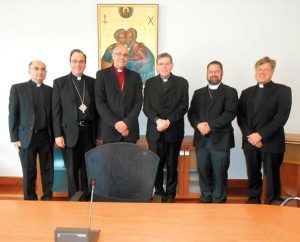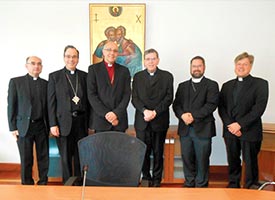By Adriane Heins
Following closely on the heels of the 496th celebration of the Reformation, leaders from two prominent pan-Lutheran organizations met Nov. 12-13 in Wittenberg, Germany — where Martin Luther first posted his 95 Theses.

Meeting to dialogue there were representatives from Lutheran World Federation (LWF) — a “global communion of 142 churches in the Lutheran tradition,” according to its website — and the International Lutheran Council (ILC), “a worldwide association of established confessional Lutheran church bodies.” On the docket: reviewing the relationship between the two organizations, as well as determining how their work and interaction will continue in the future.
Warranting considerable conversation was the way Lutherans from both groups would continue prayerfully and financially to support Lutherans suffering the effects of the recent Typhoon Haiyan in the Philippines. LCMS Disaster Response has already reached out to the Lutheran Church in the Philippines with some $350,000 in grant money, $100,000 of which was supplied to Lutheran World Relief in Baltimore, a nonprofit organization that shares a collaborative agreement with the LCMS.
“The ILC and LWF also discussed their relationship with one another, noting that 11 churches hold dual membership in the two organizations,” noted Mathew Block, editor of ILC’s news service and communications manager for Lutheran Church—Canada. Citing the meeting’s official statement, Block explained, “Recognizing some of the differences that exist between the ILC and the LWF, representatives at the meeting also ‘engaged in theological discussions regarding their respective positions and agreed that future theological discussion could be beneficial.’ ”
The group also learned more about the Wittenberg Project — a joint effort of the LCMS, Concordia Publishing House and the Independent Evangelical Lutheran Church in Germany (SELK) — by touring the “Old Latin School,” a building currently undergoing reconstruction for the future purpose of housing Lutherans from around the world interested in studying Lutheranism in the country in which it took shape.
Leaders from Lutheran churches around the world were present. Representatives from the LWF included the Rev. Martin Junge (general secretary of the LWF), the Rev. Dr. Nicholas Tai (dean of Lutheran Theological Seminary, Hong Kong), OKR Norbert Denecke (of the LWF German National Committee), the Rev. Dr. Kaisamari Hintikka (LWF assistant general secretary for Ecumenical Relations), and the Rev. Dr. Carlos Bock (director of the LWF Department for Mission and Development).
ILC leaders included Chairman Rev. Dr. Hans-Jörg Voigt (bishop of the Independent Evangelical Lutheran Church in Germany), the Rev. Dr. Albert B. Collver III (executive secretary of the ILC and director of Church Relations for the LCMS), Asia World Area Representative the Rev. James Cerdeñola (president of the Lutheran Church in the Philippines), and Secretary Gijsbertus van Hattem (president of the Evangelical Lutheran Church in Belgium).
“Both the LWF and ILC thanked one another and appreciated the frank conversation and transparency shown in the discussion,” explained Collver. “Both agreed that the conversation was valuable and look forward to the next opportunity to gather.”
The next meeting between the two groups, to be hosted by the LWF, will take place in Geneva, Switzerland, in January 2015.
Pontifical Council meeting
In conjunction with the Wittenberg meeting, a contingent of the ILC leadership traveled to Rome for a meeting with the Pontifical Council for Promoting Christian Unity (PCPCU). The council, formed by Pope John XXIII, strives to connect with other church bodies around the world while encouraging an understanding of ecumenism within its own denomination.
Representatives from the PCPCU included Cardinal Kurt Koch, president of the Dicastery, and Monsignor Dr. Matthias Türk while Voigt; Collver; the Rev. Dr. Robert Bugbee, vice-chairman of the ILC and president of Lutheran Church—Canada; and Dr. Werner Klän, professor of Systematic Theology at Lutheran Theological Seminary in Oberursel, Germany, represented the ILC.
The ILC’s official news release, following the meeting, explained that the two groups met to “discuss the possibility of extending local and regional informal discussions into an informal ecumenical dialogue process on the international level” after engaging in several informal yet forward-moving meetings in Germany and in the United States.
The release also noted that the purpose of the meeting was threefold: “a presentation of the International Lutheran Council (ILC), including its history and priorities; ecumenical relations between ILC members and the Roman Catholic Church; and future ecumenical goals.”
“It was a significant conversation we had at the Vatican with Cardinal Koch,” noted Bugbee. “It’s clear to me that the Pontifical Council is interested in getting to know better the conservative Lutheran churches represented by the ILC, and they also expressed the fact that both unity and truth are a priority for them.”
For more information on the ILC, visit its website at ilc-online.org.
Updated Jan. 8, 2014

